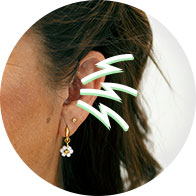Conductive hearing loss

What is conductive hearing loss?
Conductive hearing loss occurs when sound cannot travel effectively through the outer or middle ear to reach the inner ear. This makes it harder to hear faint sounds, and louder sounds may seem muffled or unclear.
The outer and middle ear are responsible for collecting and amplifying sound before it reaches the inner ear. When something disrupts this process — like a blockage or structural issue — it affects how well sound is transmitted.
This type of hearing loss is often temporary and can sometimes be improved with medical attention, depending on the underlying cause


Book a free test for conductive hearing loss
What causes conductive hearing loss?
Conductive hearing loss is a type of hearing loss that is often easily identifiable. The following causes have been associated with this type of hearing loss:
- Wax build-up
- Fluid in the ear
- Ear infections
- Damage to the ear drum
- Trauma
- Diseases such as osteoporosis and otosclerosis
What is the difference between conductive and sensorineural hearing loss?
Hearing loss is divided into the following categories (based on which part of the ear is damaged): sensorineural, conductive, and mixed hearing loss.
Conductive hearing loss is usually the result of a disruption to the sound's path as it travels from the outer/middle ear to the inner ear, while sensorineural hearing loss occurs when the delicate nerve fibres of the inner ear become damaged.
Mixed hearing loss occurs when both sensorineural and conductive hearing loss occur in the same ear.
3 signs of conductive hearing loss
Conductive hearing loss is sometimes accompanied by pain or discomfort - or the feeling that "something is wrong" in the ear. Other common signs of conductive hearing loss may include:

Treatment for conductive hearing loss
Time may be all that is needed to recover from less severe cases of conductive hearing loss. In other cases, conductive hearing loss can be treated medically in one of the following ways:
- Antibiotics and anti-fungal medications can treat hearing loss caused by an ear infection
- Surgery may be recommended to repair damages to the eardrum or middle ear, if present
- Hearing aids may also be an option if other forms of treatment have not been sufficient
- Bone-anchored hearing systems






